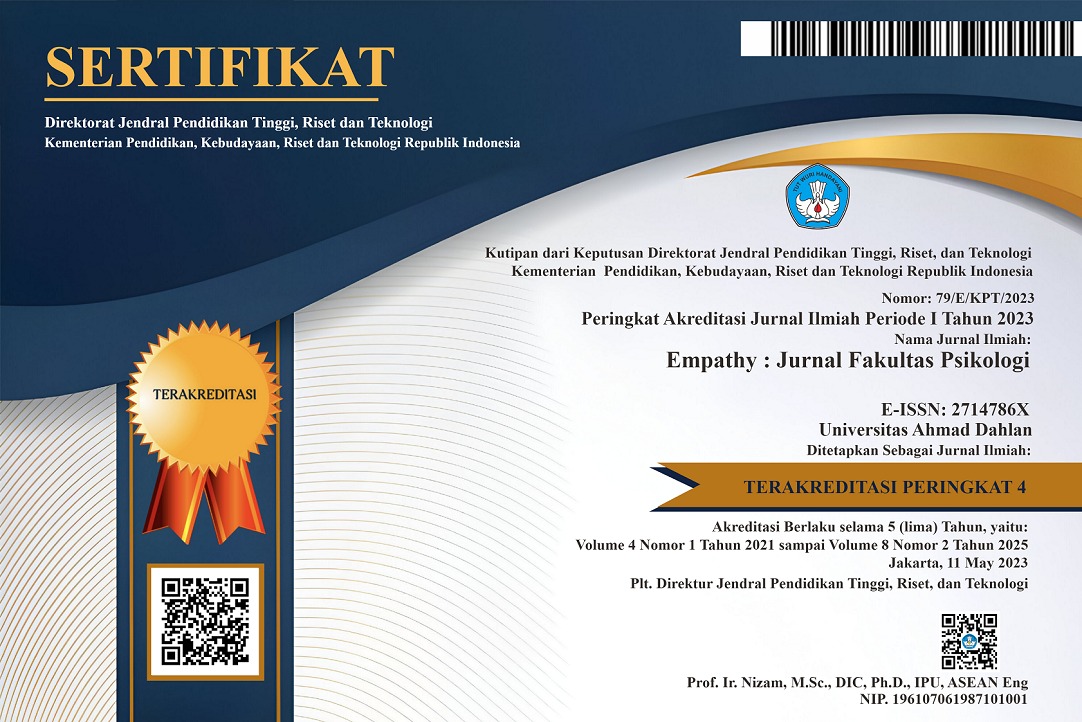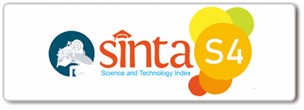- » Focus and Scope
- » Section Policies
- » Peer Review Process
- » Publication Frequency
- » Open Access Policy
- » Archiving
- » Publication Ethics
- » Plagiarism Policy
Focus and Scope
Empathy Journal accepts various manuscripts related to Psychology, such as abnormal psychology, psychology of children & adolescents with special needs, early childhood psychology, learning psychology, propaganda psychology, basic psychology, industrial and organizational psychology, Islamic psychology, disaster psychology, personality psychology, health psychology, clinical psychology, cognitive psychology, communication psychology, community psychology, counselling psychology, environmental psychology, educational psychology, child development psychology, developmental psychology, positive psychology, projective psychology, social psychology, psychometry, psychometrics, mental health, psychogerontology, history and schools of psychology, as well as psychological theories.
Section Policies
Articles
Peer Review Process
Each submitted article will be selected by the editorial board team for review by the reviewers. Furthermore, the article will be sent back to the author to be corrected if needed. Authors are given the opportunity for 30 days to improve the feedback from the reviewers and send the manuscript back to the editorial team and wait for a decision from the reviewer on whether the manuscript is accepted for publication or should be revised again. The process required for revision and feedback until the manuscript is published is expected to take no more than 3 months.
Publication Frequency
Empathy Journal is published twice every year, in June and December.
Open Access Policy
This journal provides immediate open access to its content on the principle that making research freely available to the public supports a greater global exchange of knowledge.
Archiving
This journal utilizes the LOCKSS system to create a distributed archiving system among participating libraries and permits those libraries to create permanent archives of the journal for purposes of preservation and restoration. More...
Publication Ethics
Section A: Publication and authorship
- All submitted papers are subject to strict peer-review process by at least two international reviewers that are experts in the area of the particular paper.
- Review process are blind peer review.
- The factors that are taken into account in review are relevance, soundness, significance, originality, readability and language.
- The possible decisions include acceptance, acceptance with revisions, or rejection.
- If authors are encouraged to revise and resubmit a submission, there is no guarantee that the revised submission will be accepted.
- Rejected articles will not be re-reviewed.
- The paper acceptance is constrained by such legal requirements as shall then be in force regarding libel, copyright infringement and plagiarism.
- No research can be included in more than one publication.
Section B: Authors’ responsibilities
- Authors must certify that their manuscripts are their original work.
- Authors must certify that the manuscript has not previously been published elsewhere.
- Authors must certify that the manuscript is not currently being considered for publication elsewhere.
- Authors must participate in the peer review process.
- Authors are obliged to provide retractions or corrections of mistakes.
- All Authors mentioned in the paper must have significantly contributed to the research.
- Authors must state that all data in the paper are real and authentic.
- Authors must notify the Editors of any conflicts of interest.
- Authors must identify all sources used in the creation of their manuscript.
- Authors must report any errors they discover in their published paper to the Editors.
Declaration of Authenticity and Publication Ethics (DAPE)
- The article I have submitted to EMPATHY for publication is original and free from fabrication, falsification, plagiarism, duplication, fragmentation/salami, and copyright data/content violations. It has been written by the authors listed in the article and has not been published elsewhere. It has also undergone plagiarism and self-plagiarism checks.
- The article is not under consideration for publication by any other journal and will not be submitted to any other journal for evaluation while it is being reviewed by EMPATHY.
- The article complies with the ethical code of psychology, as determined by the Indonesian Psychological Association (HIMPSI).
- The article represents research that has undergone ethical research feasibility assessment and has obtained Ethical Clearance (EC) for Research Involving Human Subjects [attached Ethical Clearance (EC), especially those with Ethical Approval Letters].
- The article does not contain statements that violate the law, defame, or contain materials that infringe upon the personal rights or property rights of any individual or entity.
- If, during the review process, I withdraw/cancel the article, I will inform the EMPATHY editor and follow the article cancellation rules established by EMPATHY, including payment of a penalty as determined by EMPATHY.
- I am willing to pay the Author Publication Charge (APC) of EMPATHY in the amount of Rp. 650,000 (Six Hundred Fifty Thousand Rupiah) before the article is published.
- If the above statement is found to be untrue and violations of the law occur, I am willing to accept sanctions in accordance with the prevailing laws on scientific publication in Indonesia and be included in the list of authors banned by EMPATHY.
Section C: Reviewers’ responsibilities
- Reviewers should keep all information regarding papers confidential and treat them as privileged information.
- Reviews should be conducted objectively, with no personal criticism of the author
- Reviewers should express their views clearly with supporting arguments
- Reviewers should identify relevant published work that has not been cited by the authors.
- Reviewers should also call to the Editor in Chief’s attention any substantial similarity or overlap between the manuscript under consideration and any other published paper of which they have personal knowledge.
- Reviewers should not review manuscripts in which they have conflicts of interest resulting from competitive, collaborative, or other relationships or connections with any of the authors, companies, or institutions connected to the papers.
Section D: Editors’ responsibilities
- Editors have complete responsibility and authority to reject/accept an article.
- Editors are responsible for the contents and overall quality of the publication.
- Editors should always consider the needs of the authors and the readers when attempting to improve the publication.
- Editors should guarantee the quality of the papers and the integrity of the academic record.
- Editors should publish errata pages or make corrections when needed.
- Editors should have a clear picture of a research’s funding sources.
- Editors should base their decisions solely one the papers’ importance, originality, clarity and relevance to publication’s scope.
- Editors should not reverse their decisions nor overturn the ones of previous editors without serious reason.
- Editors should preserve the anonymity of reviewers.
- Editors should ensure that all research material they publish conforms to internationally accepted ethical guidelines.
- Editors should only accept a paper when reasonably certain.
- Editors should act if they suspect misconduct, whether a paper is published or unpublished, and make all reasonable attempts to persist in obtaining a resolution to the problem.
- Editors should not reject papers based on suspicions, they should have proof of misconduct.
- Editors should not allow any conflicts of interest between staff, authors, reviewers and board members.
Plagiarism Policy
Papers submitted to the Empathy: Jurnal Fakultas Psikologi will be screened for plagiarism using CrossCheck/iThenticate plagiarism detection tools. Empathy: Jurnal Fakultas Psikologi will immediately reject papers leading to plagiarism or self-plagiarism.
Before submitting articles to reviewers, those are first checked for similarity/plagiarism tool, by a member of the editorial team. The papers submitted to the Empathy: Jurnal Fakultas Psikologi must have a similarity level of less than 10% (Exclude Bibliography), and the similarity score to each source is no more than 3%.
Plagiarism is the exposure of another person’s thoughts or words as though they were your own, without permission, credit, or acknowledgment, or because of failing to cite the sources properly. Plagiarism can take diverse forms, from literal copying to paraphrasing the work of another. To accurately judge whether an author has plagiarized, we emphasize the following possible situations:
- An author can literally copy another author’s work- by copying word by word, in whole or in part, without permission, acknowledge or citing the original source. This practice can be identified by comparing the original source and the manuscript/work who is suspected of plagiarism.
- Substantial copying implies an author to reproduce a substantial part of another author, without permission, acknowledge, or citation. The substantial term can be understood both in terms of quality as quantity, being often used in the context of Intellectual property. Quality refers to the relative value of the copied text in proportion to the work as a whole.
- Paraphrasing involves taking ideas, words, or phrases from a source and crafting them into new sentences within the writing. This practice becomes unethical when the author does not properly cite or does not acknowledge the original work/author. This form of plagiarism is the more difficult form to be identified.





